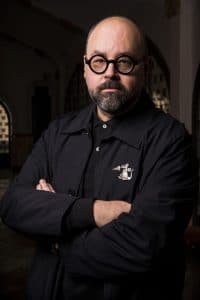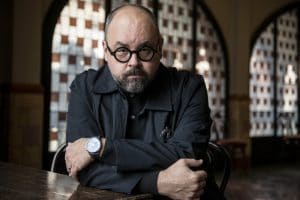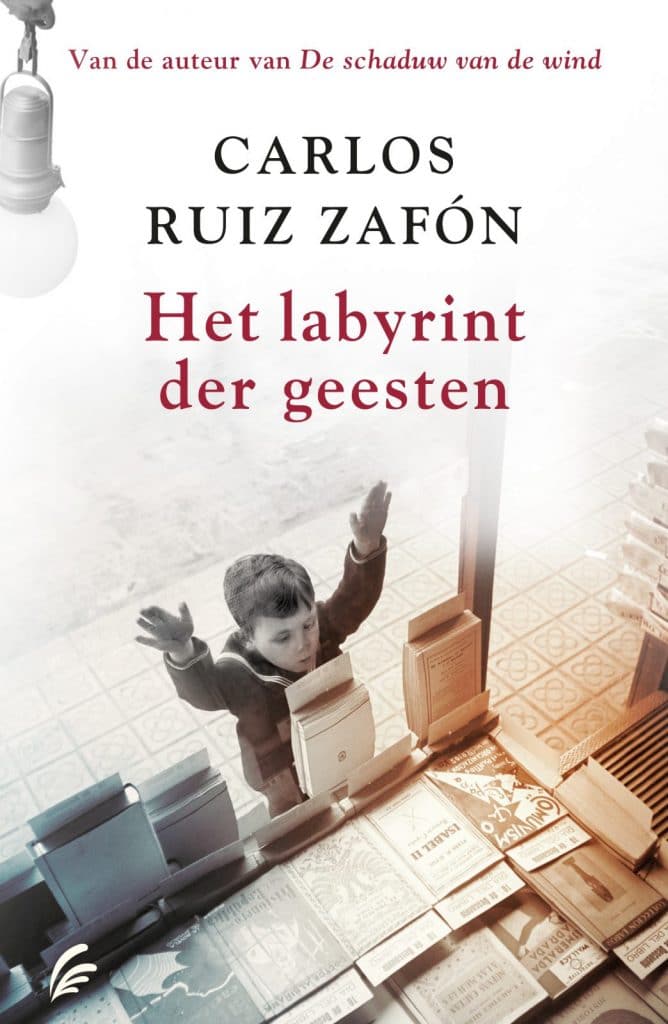Met de miljoenenseller De schaduw van de wind, het eerste deel van het vierluik Het Kerkhof der Vergeten Boeken, vestigde Carlos Ruiz Zafón in één klap zijn naam als schrijver. Zijn roman Het labyrint der geesten, die eind 2017 verscheen, was het sluitstuk van een jarenlange krachtmeting met zichzelf. Niet lang daarna werd hij ziek; begin 2018 kreeg Zafón te horen dat darmkanker had. De Spaanse schrijver is 55 jaar geworden.
Ter nagedachtenis aan deze meeslepende verhalenverteller laten we hem nog éénmaal aan het woord over dat laatste boek.
Bijna 850 pagina’s telt Het labyrint der geesten, de nieuwe roman van Carlos Ruiz Zafón (1964). De vorige drie delen van Het Kerkhof der Vergeten Boeken waren ook geen dunnetjes, maar voor de afronding van zijn vierluik heeft Zafón niet op inkt en papier bezuinigd. Zo’n volle complexe roman in een paar regels samenvatten is onbegonnen werk, maar het boek draait om de vraag wat er met Mauricio Valls is gebeurd, de beruchte voormalige gevangenisdirecteur die het heeft geschopt tot minister en plotseling is verdwenen nadat hij meerdere dreigbrieven heeft ontvangen. Alicia Gris en Juan Manuel Vargas onderzoeken de zaak en dat brengt Alicia in contact met hoofdpersonen uit de eerdere delen, onder wie boekhandelaar Daniel Sempere en Fermín Romero de Torres.
Uiteraard is net als in de voorgaande romans ook in dit slotdeel een belangrijke rol weggelegd voor een boek, in dit geval Het labyrint der geesten van Victor Mataix. Op kunstige wijze weet Zafón alle draadjes op zijn tamelijk complexe weefgetouw met elkaar te vervlechten.
Het labyrint der geesten heeft drie jaar langer op zich laten wachten dan u had gedacht. Waarom?
‘Ik heb over geen van de boeken zo lang gedaan als over deze roman, het was verreweg ‘t moeilijkste deel om te schrijven. Soms moest ik een tijdje stoppen, en ik heb veel passages opnieuw geschreven. Ik denk altijd lang na voordat ik begin met schrijven, want de architectuur van deze romans is heel belangrijk en vraagt veel aandacht. Als ik eenmaal begin, neemt het schrijven en schaven meestal een jaar in beslag, ongeacht de omvang van het boek. Nu duurde het drie jaar.’
Voelde u bij dit laatste deel meer druk op uw schouders?
‘Ja, maar ik legde mezelf die druk op. Dit boek was immers het sluitstuk, dus de lezersverwachtingen, de spanningsopbouw – álle puzzelstukjes moesten kloppen. Het moest precies zo worden als ik in mijn hoofd had, daar kon ik geen concessies aan doen. Dus steeds als ik merkte dat iets niet helemaal klopte, moest ik terug om dat te veranderen, en dat had dan weer consequenties voor de rest, als de rimpelingen in het water.’
Wat heeft u bijvoorbeeld moeten veranderen?
‘Het belangrijkste personage in deze roman, Alicia Gris, was in mijn oorspronkelijke idee een man. Daar deugde niets van. Ik had weliswaar een lijstje van wat dat personage allemaal moest doen, maar het personage zelf kwam niet tot leven. Pas na een tijd besefte ik dat dit personage een vrouw moest zijn, een zeer specifieke vrouw. Toen viel het op z’n plaats.’

Wat voor vrouw is Alicia?
‘Ik zie haar als een deel van mezelf. Mijn kleine duistere engel. De gruwelen van de oorlog hebben haar fysiek en geestelijk beschadigd en haar het leven ontnomen dat ze voor zich zag, wat haar ertoe heeft gedwongen iemand te worden die ze niet wil zijn. Dat levert een voortdurende innerlijke strijd op. Ze heeft een schild om zich heen gevormd, waarmee ze de buitenwereld bespeelt; soms is ze een femme fatale, soms een fragiel madammetje, dan weer een mysterieuze vrouw. Ze is het allemaal tegelijk en ook weer niet. Wat ze duidelijk wél is, is een wezen van licht en duisternis. Iemand zonder scrupules, met een tamelijk analytische en koude perceptie van de wereld. Ze wil een beter mens zijn, en verlost raken van haar pijn en razernij, het verlangen de wereld te gronde te richten.’
Waarin lijkt ze op u?
‘Mijn waarneming en manier van analyseren lijkt op die van haar. Ze is iemand met wie ik me zeer verwant voel. Te midden van alles wat ze bevecht, weet ze altijd wat ze moet doen en blijft ze trouw aan zichzelf. Eigenlijk zijn er drie personages die een deel van mij representeren: Alicia Gris; Julián Carax, de obscure schrijver uit het eerste deel en een soort gothic karikatuur van mijzelf, met mijn slechtste eigenschappen; en Fermín Romero de Torres, die mijn morele kompas en gevoel voor humor vertegenwoordigt.’
Met welke verhaallijn of personage heeft u het meest geworsteld?
‘Met alles! Ik ben een verhalenverteller. Dat betekent dat je een theaterstuk creëert, met licht en rook en spiegels, muziek en decors, kostuums, make-up, en dat je figuren heen en weer laat bewegen en tekst geeft. Voor mij is het vakmanschap van het vertellen belangrijker dan het verhaal op zich. Dus ik worstel met de hele constructie, met al die onderdelen die nodig zijn en die ik zo goed mogelijk probeer neer te zetten. In elk geval zo goed mogelijk als ik kan.’

U heeft bijna twintig jaar aan deze tetralogie gewerkt, waarin zo veel verhaallijnen en tientallen personages een rol spelen. Hoe heeft u de regie daarover gehouden?
‘Vooraf heb ik tegen mezelf gezegd: dit werk wordt een complex geheel, met plots en subplots en nog meer subplots die zelf ook weer subplots hebben. Als een jongleur die tientallen ballen in de lucht houdt. Je kunt er steeds eentje bijnemen, tot je op het punt komt dat er een dreigt te gaan vallen. Mijn regel was: ik maak het zo complex als ik kan hanteren, zonder mijn toevlucht te moeten nemen tot aantekeningen. Ik heb gelukkig een goed geheugen. Ons brein is een machine en de ene machine kan dit, de andere dat. Dit is hoe mijn brein werkt. Ik hou van complexe dingen, van labyrinten.’
Wilt u de lezer uitdagen of vooral uzelf?
‘Vooral mezelf, denk ik. De lezer moet de illusie krijgen dat het simpel is, alsof je door kristalhelder water zwemt, en niet hoeven terugbladeren omdat hij iets niet begrijpt. Mijn doel is in de eerste plaats ervoor te zorgen dat de lezer zich goed vermaakt en zich helemaal in die wereld onderdompelt. Daartoe moet ik het op de best mogelijke, de meest verleidelijke en boeiendste manier vertellen. Als alles klopt, plant een verhaal gaandeweg kleine zaadjes in het hoofd van de lezer, die tot bloei komen als hij het boek uit heeft. Die onzichtbare zaadjes bieden andere perspectieven en ideeën, en zorgen ervoor dat hij anders naar dingen kijkt dan daarvoor. Dat is wat ik hoop te bewerkstelligen.’
Nu kopen:
Het labyrint der geesten is verschenen bij Signatuur, € 29,99

